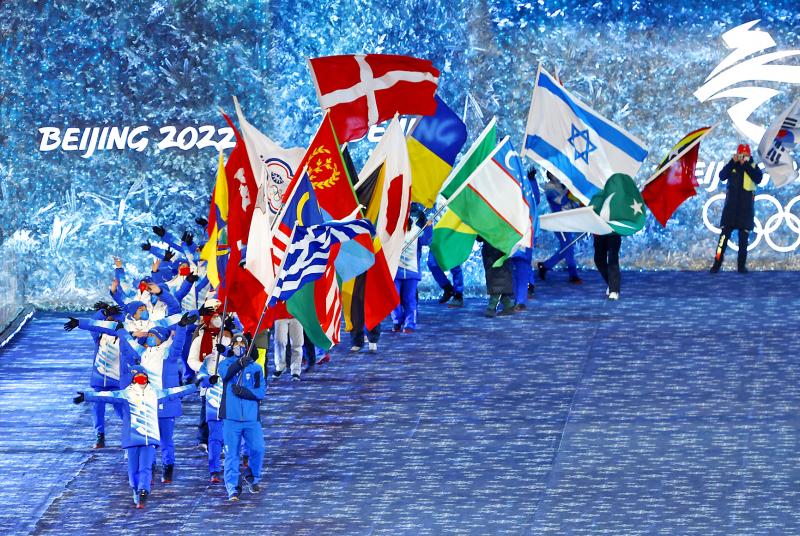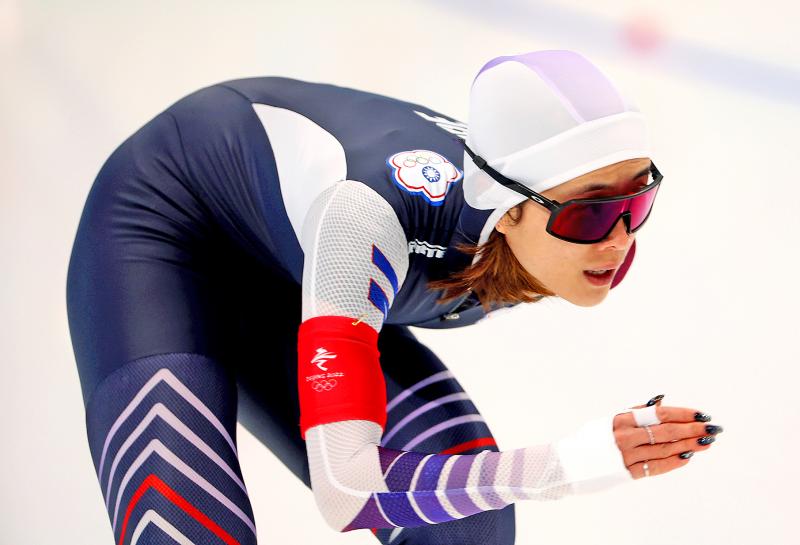After controversy sparked by Taiwanese speedskater Huang Yu-ting (黃郁婷), the Sports Administration yesterday announced that athletes who are to compete in the Asian Games in Hangzhou, China, in September would be given a clear set of rules to follow regarding conduct.
Huang drew widespread criticism for actions and comments she made before and during the Beijing Winter Olympics, which ended yesterday.
Before the Games began, the two-time Olympian uploaded a video on Instagram showing her wearing the Chinese speedskating team’s uniform while training in Salt Lake City, Utah.

Photo: Reuters
After the 1,500m speedskating race on Feb. 7, Huang told the Beijing Daily that she was touched by the enthusiasm of the audience at the race, as it “felt like I was competing at home.”
After the 1,000m race on Thursday last week, in which she placed 24th, Huang thanked her supporters on Facebook and said “the comment section is now open for haters and trolls.”
She posted the same remark on the Chinese microblogging Web site Sina Weibo, but added that “there are no trolls in the comment section” there.

Photo: EPA-EFE
Premier Su Tseng-chang (蘇貞昌) on Saturday asked the Ministry of Education and the Sports Administration to investigate Huang’s remarks and actions before and during the games to determine whether she should be punished.
Officials were also told to review existing rules and propose changes so that future national team athletes could have a clear code of conduct to follow when representing Taiwan abroad.
While Huang was Taiwan’s flagbearer at the opening ceremony of the Beijing Olympics, sports officials said on Friday that Lee Wen-yi (李玟儀), Taiwan’s first female Olympic Alpine skier, would carry the national flag at the closing ceremony.
Lan Kun-ten (藍坤田), the Sports Administration’s director of competitive athletics, said that the agency would soon gather representatives from the Chinese Taipei Olympic Committee and Chinese Taipei Skating Union to discuss Huang’s case, as well as her subsidies.
The agency would determine a penalty in one to two weeks, he added.
“We will finish amending the Regulations Concerning Audition, Training and Registration of Sports Coaches and Athletes for National Representative Team of International Games (國家代表隊教練與選手選拔培訓及參賽處理辦法) before the Summer [FISU] World University Games in June, so athletes competing in the Asian Games in China’s Hangzhou city in September can follow the code of conduct,” Lan said.
Chinese Taipei Olympic Committee acting secretary-general Steven Chen (陳士魁) on Saturday said that Huang is to participate in two tournaments in the US next month.
A meeting to review the Winter Olympics is likely to be held in April, as Huang needs to quarantine upon returning to Taiwan, he said.
A number of issues should be settled first to determine a penalty for Huang, Chen said.
Neither the national team athlete manual nor the information session for athletes before the trip to Beijing outlines how athletes should conduct themselves or indicate a punishment for misconduct, he said.
National team athletes are only disqualified if they breach anti-doping regulations or other sports regulations, Chen said.
What athletes say on social media and what they wear during practice do not constitute disqualification under the current regulations, he said.

SECURITY: As China is ‘reshaping’ Hong Kong’s population, Taiwan must raise the eligibility threshold for applications from Hong Kongers, Chiu Chui-cheng said When Hong Kong and Macau citizens apply for residency in Taiwan, it would be under a new category that includes a “national security observation period,” Mainland Affairs Council (MAC) Minister Chiu Chui-cheng (邱垂正) said yesterday. President William Lai (賴清德) on March 13 announced 17 strategies to counter China’s aggression toward Taiwan, including incorporating national security considerations into the review process for residency applications from Hong Kong and Macau citizens. The situation in Hong Kong is constantly changing, Chiu said to media yesterday on the sidelines of the Taipei Technology Run hosted by the Taipei Neihu Technology Park Development Association. With

CARROT AND STICK: While unrelenting in its military threats, China attracted nearly 40,000 Taiwanese to over 400 business events last year Nearly 40,000 Taiwanese last year joined industry events in China, such as conferences and trade fairs, supported by the Chinese government, a study showed yesterday, as Beijing ramps up a charm offensive toward Taipei alongside military pressure. China has long taken a carrot-and-stick approach to Taiwan, threatening it with the prospect of military action while reaching out to those it believes are amenable to Beijing’s point of view. Taiwanese security officials are wary of what they see as Beijing’s influence campaigns to sway public opinion after Taipei and Beijing gradually resumed travel links halted by the COVID-19 pandemic, but the scale of

A US Marine Corps regiment equipped with Naval Strike Missiles (NSM) is set to participate in the upcoming Balikatan 25 exercise in the Luzon Strait, marking the system’s first-ever deployment in the Philippines. US and Philippine officials have separately confirmed that the Navy Marine Expeditionary Ship Interdiction System (NMESIS) — the mobile launch platform for the Naval Strike Missile — would take part in the joint exercise. The missiles are being deployed to “a strategic first island chain chokepoint” in the waters between Taiwan proper and the Philippines, US-based Naval News reported. “The Luzon Strait and Bashi Channel represent a critical access

Pope Francis is be laid to rest on Saturday after lying in state for three days in St Peter’s Basilica, where the faithful are expected to flock to pay their respects to history’s first Latin American pontiff. The cardinals met yesterday in the Vatican’s synod hall to chart the next steps before a conclave begins to choose Francis’ successor, as condolences poured in from around the world. According to current norms, the conclave must begin between May 5 and 10. The cardinals set the funeral for Saturday at 10am in St Peter’s Square, to be celebrated by the dean of the College